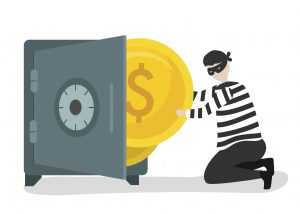One of the biggest misconceptions about Bitcoin is that it is a scam similar to various Ponzi and pyramid schemes. This is a consequence of multiple reasons, one of them being that very few people actually understand what a Ponzi scheme is, and there is a strong reason to believe that even fewer people understand Bitcoin and cryptocurrencies.
So the only way to tackle this issue is to deconstruct Ponzi schemes and see if there really is any semblance with cryptocurrencies. This is exactly what we’re going to do in this blog post.

What is a Ponzi scheme?
A typical Ponzi scheme is a type of investment scam that promises high returns with little or no risk. People are usually enticed by clever marketing into making an investment, but there is a catch. The only people who usually profit from these schemes are a select few of early investors. That is because they receive funds obtained from more recent investors.
A Ponzi scheme will last until the point where not enough money is coming in. This depends on the size of the required investment because a small investment means that more people can participate and the scheme will last longer.
A pyramid scheme is similar, although there are slight technical differences between the two. Pyramids are so-called “get-rich-quick” businesses and they work on the basis of recruiting new members with a false promise of payment for enrolling new members, not for selling the product or delivering services. Both Ponzi and pyramid schemes are illegal. For the sake of the simplicity of this blog, we treat both as one and the same.
Cryptocurrencies vs Ponzi Schemes
The truth is that most people who invest in various Ponzi schemes will lose their money. When it comes to crypto, there are people who lost money as well, but for totally different reasons. This doesn’t detract the naysayers from saying that everything crypto automatically equals a scam.
When people lose money with cryptocurrencies, it is a result of an unfortunate set of circumstances, human nature, and how markets work. Let me briefly explain.
Bitcoin and crypto went through many cycles of ups and downs. Read more about Bitcoin price cycles to understand bullish and bearish markets. One of the largest and latest “ups” took place at the tail end of 2017. It caused a frenzy of herd-like behavior from all types of people who suddenly developed a feverish interest in cryptocurrencies just because everyone was talking about it.
Everyone was throwing money into Bitcoin without much of a second thought as the price was rising so rapidly. The fear of missing out was very strong when seemingly easy gains were made possible from buying and selling almost any cryptocurrency.
The irony is that whenever people get excited about an investment is usually the exact time when it is already overpriced.
Whenever the price starts to decline as a natural result of market cycles, many people start selling at a loss, so the crypto world always has some unhappy customers who buy high and sell low — in theory, they do the exact opposite of the old wisdom of buying low and selling high. But this doesn’t mean that they were deceived by a scam.
The catch here is that it is hard to determine if the price at any given time is high or low. When bitcoin was being traded at 15,000 EUR, people were still expecting it to go even higher. We now know that they were wrong, but the price could very well have reached higher numbers, in which case they’d be right.

Why we believe that Bitcoin is not a scam
With crypto, it is up to the individual investor to know when to take a profit, whereas with Ponzi schemes, it is basically already pre-determined who will lose money.
That is not to say that the history books of crypto don’t contain some blatant scams (especially some of the ICOs from last year), but cryptocurrencies, by design, are not Ponzi schemes. Why? First of all, there is a solid, transparent and innovative technology behind it. The blockchain and the currency called Bitcoin will not cease to exist only because someone made a bad decision about buying and selling it at a non-convenient time. More to that, with Bitcoin, there is no central team to be prosecuted and held responsible — it is a trustless and transparent network that relies on the random computers (nodes) in this network.
With Bitcoin, there is a very simple formula by which some people lose money and some people earn money, and it is all dictated by regular and healthy market fluctuations.
The main reason why people lose money with Ponzi schemes, on the other hand, is that they are purposefully deceived and — as a result — they don’t actually know what they’re investing in and more importantly, how to invest and/or trade. And although you could draw a parallel with crypto where some people simply aren’t fit to make an educated decision about an investment, an important distinction has to be made by the fact that they are not purposefully deceived.
You see, cryptocurrencies are strongly backed by people who believe in the technology and they will continue with the support and development.
For example, I see a lot of value in the blockchain technology, Bitcoin, and other cryptocurrencies. But remember that with any cryptocurrency, there is no guarantee of profit! That is why you should always be wary of investment opportunities where there is “a guaranteed profit”. Always do your own research.
The truth is that cryptocurrencies can be placed side by side with traditional stocks, commodities, and other instruments trading on the traditional stock markets. They can have different functions, utilities, and meanings, but at their core, they are always designed to run the network or be used by the network. There is no guaranteed profit from any of them as they were designed to be useful for something (payments, utilizing the network, etc.).
When you use crypto as a speculative means, make sure you know how the technology and the markets work before you put your money at stake. When you are ready to enter the world of cryptocurrencies in a safe and easy way, register to Kriptomat.
Disclaimer: Our blog posts do not represent an investment advice and nothing in them should be construed as investment advice. Blogs merely provide information and education for the interested public.
NOTE
This text is informative in nature and should not be considered an investment recommendation. It does not express the personal opinion of the author or service. Any investment or trading is risky, and past returns are not a guarantee of future returns. Risk only assets that you are willing to lose.




 IOS
IOS Android
Android